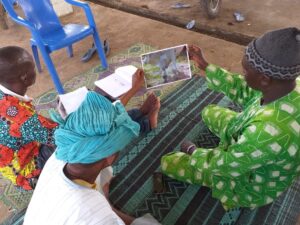2 November 2023
Brucellosis, a major zoonosis, is still rife in wildlife, domestic livestock and the human population in low-income countries.
Since 1970, Côte d’Ivoire has been implementing strategies to control brucellosis, based on raising community awareness and vaccinating domestic livestock. Despite the constant efforts of the health authorities, the disease persists and is spreading to such an extent that in 2017, it was classified as one of the five priority zoonoses to be eradicated as part of the global health security agenda.
Inequalities in access to information as a limiting factor in the control of brucellosis
Control strategies involve preventive and curative action, requiring the active participation of communities affected or at risk. However, socio-anthropological research carried out in the north of Côte d’Ivoire by Dr Stéphane Babo, a fellow of Afrique One research consortium, has revealed an asymmetry in knowledge about brucellosis between public health and veterinary workers, and an asymmetry in access to information about the disease within communities between men and women.
« Analyses show that men (livestock owners and shepherds), who are the primary contacts for the veterinary health authorities, are generally better informed about brucellosis than women. Yet women are just as exposed to the risks of brucellosis transmission as men. When caring for animals, men in particular obtain information from vets, who are more familiar with the disease. On the other hand, public health workers, who are responsible for human health, have a lack of knowledge about the disease, which undermines the disease surveillance and control system », explains Dr Stéphane Babo.
Women face socio-cultural and systemic barriers to accessing health information, while they are highly exposed to the disease because of their role in processing milk and caring for young animals.

Co-production of health knowledge between the community and stakeholders in the health system
According to Afrique One, it is imperative for all stakeholders to have access to knowledge about brucellosis in order to take collective action, with the main focus on the population at risk, children who consume raw milk and women who are milk processors. This can be achieved through a co-production process.
« The asymmetry of knowledge between public health professionals on the one hand, and men and women on the other, calls for capacity-building among the various players and, above all, access to information that is equitably shared. For us, as researchers, it is crucial to understand the interactions between stakeholders and their ecosystem in order to help operationalise the integrated One Health approach and effectively combat brucellosis. It is important to understand that each stakeholder (community or institutional), even with varying levels of knowledge about the disease, has an important contribution to make in the fight against brucellosis and other zoonotic diseases », says Prof. Gilbert Fokou, member of the « Collective action and behaviour change »transversal programme of the Afrique One.
Working together in a coordinated way to combat brucellosis
Knowledge about brucellosis exists and needs to be made available through appropriate channels to every player who is exposed to or has some responsibility for managing the disease. There is therefore a need to build the capacity of the various players (men, women, human and animal health workers) so that they have more knowledge about how to manage the disease. According to Afrique One researchers, this means strengthening coordination, collaboration and communication between human and animal health workers on the one hand, and by comparing the knowledge and practices of communities with scientific elements, co-designing effective interventions that benefit everyone.
« Interventions on animals through mass vaccination of livestock are a prerequisite for the success of brucellosis control strategies. But sustainable action requires cross-sectoral partnerships and the harmonisation of information on brucellosis among all stakeholders », says Prof. Bassirou Bonfoh, Director of Afrique One.
From 2016-2022, Afrique One, funded by a consortium of donors including the Wellcome Trust, DFID and others, trained 72 fellows in Africa, 11 of whom conducted transdisciplinary research on brucellosis. They identified gaps in knowledge and collaboration, despite advances in the diagnosis and vaccinology of the disease. Work on this topic has produced around fifteen scientific publications.
Afrique One would like to commemorate Prof. Rudovick Kazwala, emeritus researcher at Sokoine University of Agriculture, located in Morogoro, Tanzania, and a founding member of the Afrique One consortium, who passed away on 03 April 2023. He was in charge of the Afrique One training and research group focusing on brucellosis, which he led from his hospital bed until his last breath…
Credit photo: Dr Stéphane Babo
Share on: